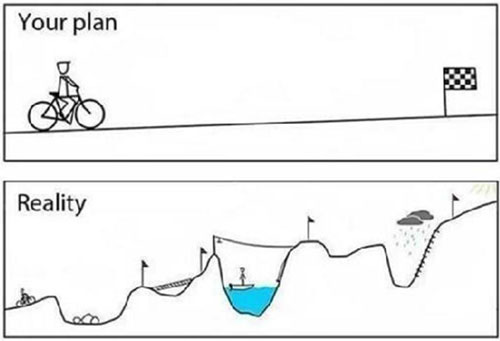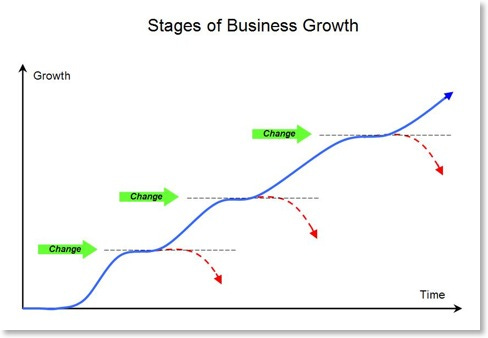You will experience 8 stages of growth throughout your life. In fact, you’re probably in stage 7 already. Well done. Almost there.
The 8 stages of growth were developed in the mid-20th century by the German-born psychologist Erik Erickson. Once they were published, Erickson’s concepts pretty much became the psychological standard, They stomped on the fingers of Freud’s human development theories, moving them down a rung on the ladder.
I know you’re curious to know what the 8 stages are, so let’s avoid the suspense-filled mumbo-jumbo and get right to it. Here you go:
- Infancy
- Toddlerhood
- Preschool years
- Early school years
- Adolescence
- Young adulthood
- Middle adulthood
- Late adulthood
As I said, you’re probably in Stage 7, amiright?
But wait, there’s more.
Herr Erickson was a master of conflict. In fact, he is most well known for coming up with the concept of identity crisis. Yeah, you can thank him for that inner conflict.
Consequently, Erickson didn’t define the 8 stages of life by something as simple as age range. Instead, in true Ricky style, each stage is defined by a key conflict.
For instance, in Stage 5 (adolescence) we are torn by the conflict between Identity and Confusion.
It’s during the teenage years that we strive to forge our own identity. Those who are successful in creating a healthy identity continue through adulthood with a better understanding of who they are.
Those who don’t create a healthy identity usually end up feeling confused about their place in life.
(I fully expect you to be doing some serious self-analysis right now, palsky).
Stage 7 (Middle Adulthood), the one you’re probably swimming in, is defined by the conflict between Generativity and Stagnation.
This conflict is important to understand.
But first, I need to tell you about a little something special from another famous German (what’s with all the smart Germans?!).

The Special Theory
One of Albert Einstein’s most interesting theories is the theory of special relativity. It’s like his famous theory of relativity, but special.
The basic gist of the special theory is that one’s perception of another object’s speed and trajectory will change relative to your own location, speed and trajectory.
Let me explain.
Let’s say you are on a train going 50mph and you pass a train going 30mph in the exact opposite direction. From your perspective there in the Bar Car (you lush), that other train will appear to be traveling at 80mph away from you (your 50 in one direction plus their 30 in the opposite.)
On the other hand, let’s say you’re still in the train traveling at 50mph and that other train is still traveling at 30mph. This time, however, both trains are going in the same direction. When you’re train passes the other, it will now seem like that same train is traveling only 20mph in the opposite direction as you.
Perspective is everything.
An object’s speed and movement are relative to the observer.
Make sense?
Good.
Now let’s talk about your company for a minute.
Trust me, this is all going to come together shortly.

The Company Growth Cycle
Despite what your 3-year forecast is claiming, a company’s growth trajectory is rarely a smooth climb to the top right.
Growth is about peaks and valleys.
Good growth is when each peak is bigger than the previous and each valley is less than the one before.
However, that doesn’t even take into account the plateaus.
Plateaus are inevitable in every company’s growth trajectory.
Those plateaus actually happen at specific times and for specific reasons, none of which I’m going to explain now. Just trust me on this.
During plateaus, revenue growth slows down. In many cases, revenue actually begins to decrease.
This halted growth is called “stagnation”.
And that, of course, takes us right back to Erickson’s 8 stages of growth.

Life Stage Number 7: Stagnation
As mentioned above, the seventh stage of human growth is Middle Adulthood. According to Erik Erickson, this stage is marked by the conflict between Generativity and Stagnation.
More specifically, people in Middle Adulthood are often striving to find meaning and purpose for their time on this planet. They are seeking to leave the world in a better place than when they found it.
This is often done through parenting, caring for the elderly, or contributing to the community. All of these things give clarity and purpose to the individual. Satisfaction for the middle adult comes as they see growth and change happening.
The people who fail to find a way to make a positive change are the ones who succumb to stagnation.
This stagnation is marked by a lack of sense of self, feelings of uselessness, and a lack of positivity. It may also be marked by a failure to change or a lack of willingness to extend outside one’s comfort zone.
You know what’s also like this?
Companies who are experiencing a plateau.
See, I told you it will all start to come together.
Read on, mon ami.

The Stagnant Company
When a company reaches a plateau, it is often due to the same reasons described by Erikson in his description of stagnant Middle Adults.
- Lack of purpose
- Failure to change
- Unwillingness to extend beyond the comfort zone
- Inability to keep leaving a positive mark on society
Companies often believe that their plateau is the problem. So leaders push employees harder. Maybe they fire some of them. They try to force the staff to work more hours and force themselves out of the plateau.
But, in the immortal words of Einstein:
“You can’t solve your problems with the same thinking you used to create them.”
The plateau isn’t the company’s problem. It’s not the disease – it’s merely a symptom.
Without addressing the disease that caused the plateau, the company will remain stagnant.
But here’s the important insight that we got from Einstein’s theory of special relativity:
Stagnation is about perspective.
A company’s movement is like the train we discussed above. The level of stagnation is relative to the movement of others in the industry.
There’s no such thing as a company standing still.
A plateau is only about stagnation when you only consider the company’s history. If you look out the windows of activity in the industry, the view paints a completely different story.
Your competitors are still growing. They are still moving like that 50mph train.
If your progress slowed down to a 30mph train, your company is actually moving backward from the perspective of your competitors.
Plateaus are inevitable, growth is optional.
Companies don’t remain stagnant, they regress.
If your growth has flattened, the answer is not always to push the team harder. It’s not necessarily time to start firing.
It’s time to step out of your comfort zone and address the core issues before you fall back too far to recover.
Drop me a line. Let’s chat.
